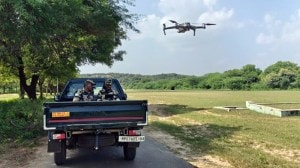PM wishes peace, but no resolution
The Government today desisted from adopting a resolution on Iraq, saying it wanted flexibility in its stand, specially with the Prime Minist...

The Government today desisted from adopting a resolution on Iraq, saying it wanted flexibility in its stand, specially with the Prime Minister leaving for the NAM summit next week.
On his part, Prime Minister A.B. Vajpayee voiced his opposition to war. Intervening during question hour in response to a suggestion from Ramdas Athvale, Vajpayee said: ‘‘War should not take place anywhere — neither between the US and Iraq, nor between India and Pakistan.’’
Later, during a discussion on Iraq, the Opposition was on its feet demanding a resolution soon after Finance Minister Jaswant Singh — on special request from the Prime Minister — made a statement in Lok Sabha on the Government’s behalf. He said the Government’s stand was clear — that any action against Iraq must be based on ‘‘broadest possible international consensus’’ and UN Security Council (UNSC) must give careful thought before taking a decision.
However, he added the UNSC ‘‘could not wait indefinitely to obtain Iraq’s compliance’’ on Resolution 1441.
Led by Congress MP Mani Shankar Aiyer, Opposition members alleged the Government was ‘‘twisting’’ what the parties had decided on. Speech made, Jaswant walked out, leaving Parliamentary Affairs Minister Sushma Swaraj to face angry members.
‘‘The words of a resolution become binding and not even a comma can be changed. When the Prime Minister goes to NAM, he will express our views . The spirit is more important than the words. Grant some flexibility to the Government,’’ said Swaraj.
Earlier, Jaswant said: ‘‘India has maintained that wars and conflicts are always the last option, not the first.’’ Responding to stiff Opposition criticism of US threats of unilateral military action against Iraq, Jaswant said UN weapons inspectors should be given ‘‘complete and unfettered opportunities’’ to complete their task.
Interestingly, throughout his speech, Jaswant did not mention the US even once. It was always Iraq or the ‘‘action against it.’’
The UNSC should take into account all the ramifications before taking any decision, he said. These included dangers posed by development of Weapons of Mass Destruction, the risks of their diversion to non-state actors and the rationale and effectiveness of weapons inspections.
It should also keep in mind the impact of its action and its larger implication for peace, stability and security of the region and the dangers of radicalisation. He added that disruption of oil supplies and economic and social repercussions as well as refugee problem should be considered before taking any step.
Jaswant also mentioned India’s vital ‘‘economic interests’’ with Iraq and added the well-being of the Indian diaspora in the Gulf had to be taken into consideration.
Photos





- 01
- 02
- 03
- 04
- 05

























